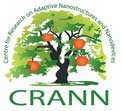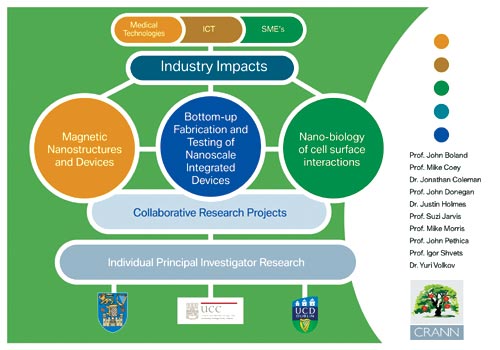| 2006 |

|
YEAR BOOK |
Trinity College Dublin
|
CRANN – Centre for Research on Adaptive Nanostructures and Nanodevices
|

CRANN is affiliated with the Schools of Physics, Chemistry and the Life Sciences in TCD. It provides a unique collaborative and inter-disciplinary environment in which innovative research is carried out by teams of internationally renowned experts, from the Schools, and leading industry figures from our industrial partners. This research aims to address the big challenges faced by the Information and Communication Technologies and Biotechnology sectors. One of the defining features of CRANN is its mission to combine the academic excellence of research-ers at our partner universities, TCD and UCC, with the expertise and experience of our industrial partners, Intel and HP. CRANN capitalises on the research and innovation that comes from having the best people in the best environment.
Research at CRANN
CRANN's objective is to make a significant impact on nanoscience over the next ten years. The focus of its research is on the physics and chemistry of materials, including biomolecules. These materials are specifically structured at the nanoscale with the aim of achieving novel device functionality. The major research areas include the liquid-solid interface, laterally-structured systems and surface-grown systems, and were specifically identified because they leverage existing expertise and have the potential to produce significant innovation in science and technology.
CRANN's mission encompasses three research themes:
-
Magnetic structures and devices
-
Bottom-up fabrication and testing of nanoscale integrated devices,
-
Nano-biology of cell surface interactions,
Research at CRANN combines the strengths of our researchers and industrial partners across the three research strands. Researchers are each involved in one or more of these thematic areas through a range of collaborative, interdisciplinary research projects supported by the Centre and SFI as well as other national and international funding agencies. Further details of the research being carried out under theses themes are available on our website:
www.crann.tcd.ie


Working in CRANN
There is a broad spectrum of researchers based in CRANN. We take a number of Transition Year (TY) placement students for a few weeks each year. The TY students spend time shadowing postgraduate researchers, and are given the opportunity to do a few experiments of their own. Each summer we welcome both UREKA/SURE (third level students) and STAR (secondary school teachers) researchers to the Centre. These researchers are involved in current research projects of 10-12 weeks duration where they make a significant contribution to the research group with whom they are placed. We have approximately 100 resear-chers at postgraduate and postdoctoral level in the Centre actively engaged in research at the cutting edge of nanoscience. They are complemented by a number of industrial researchers from our industrial partners Intel and Hewlett-Packard, who each spend between 2 and 5 days per week full-time working in the Centre.

Contact: E-mail: [email protected]
Web: www.crann.tcd.ie